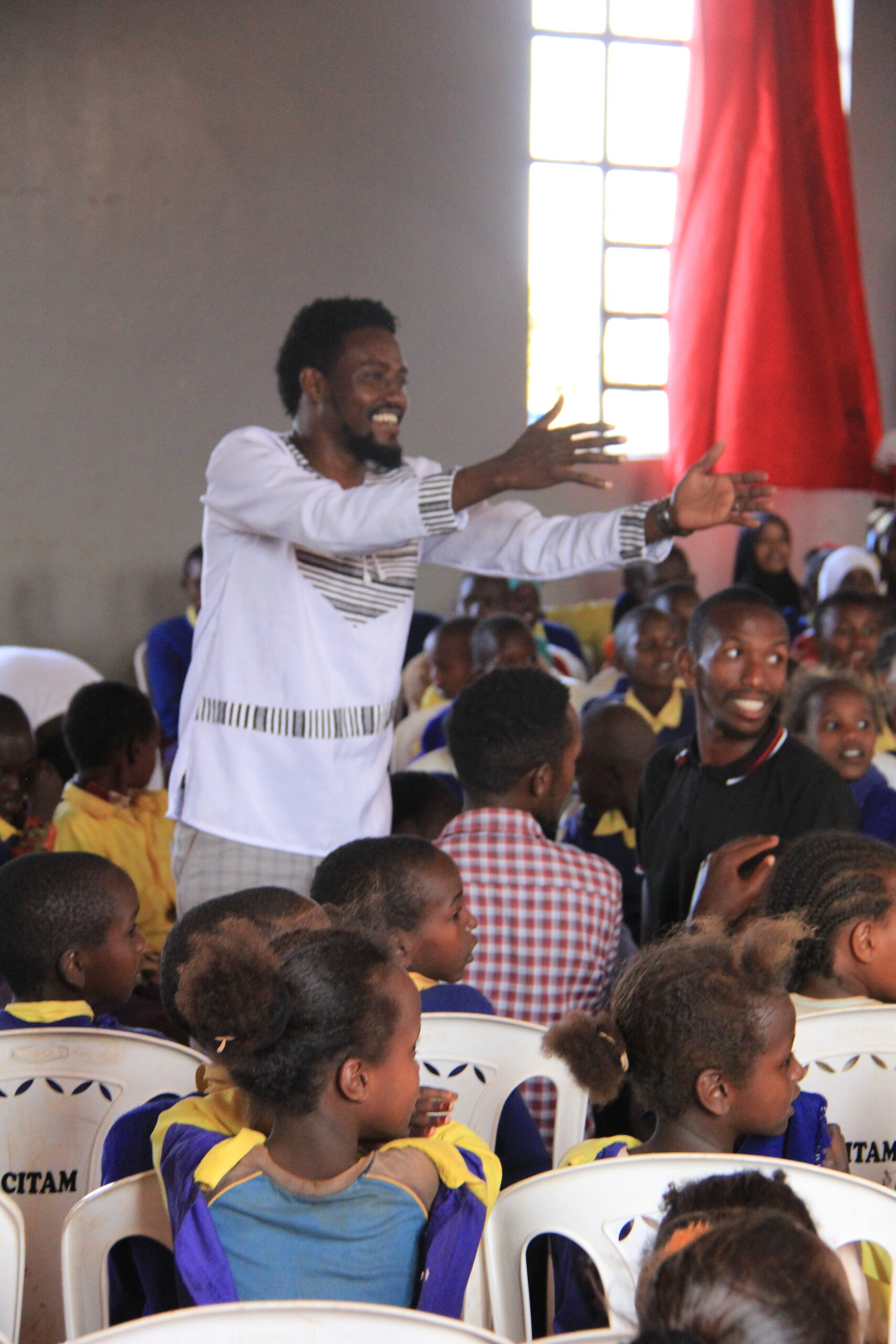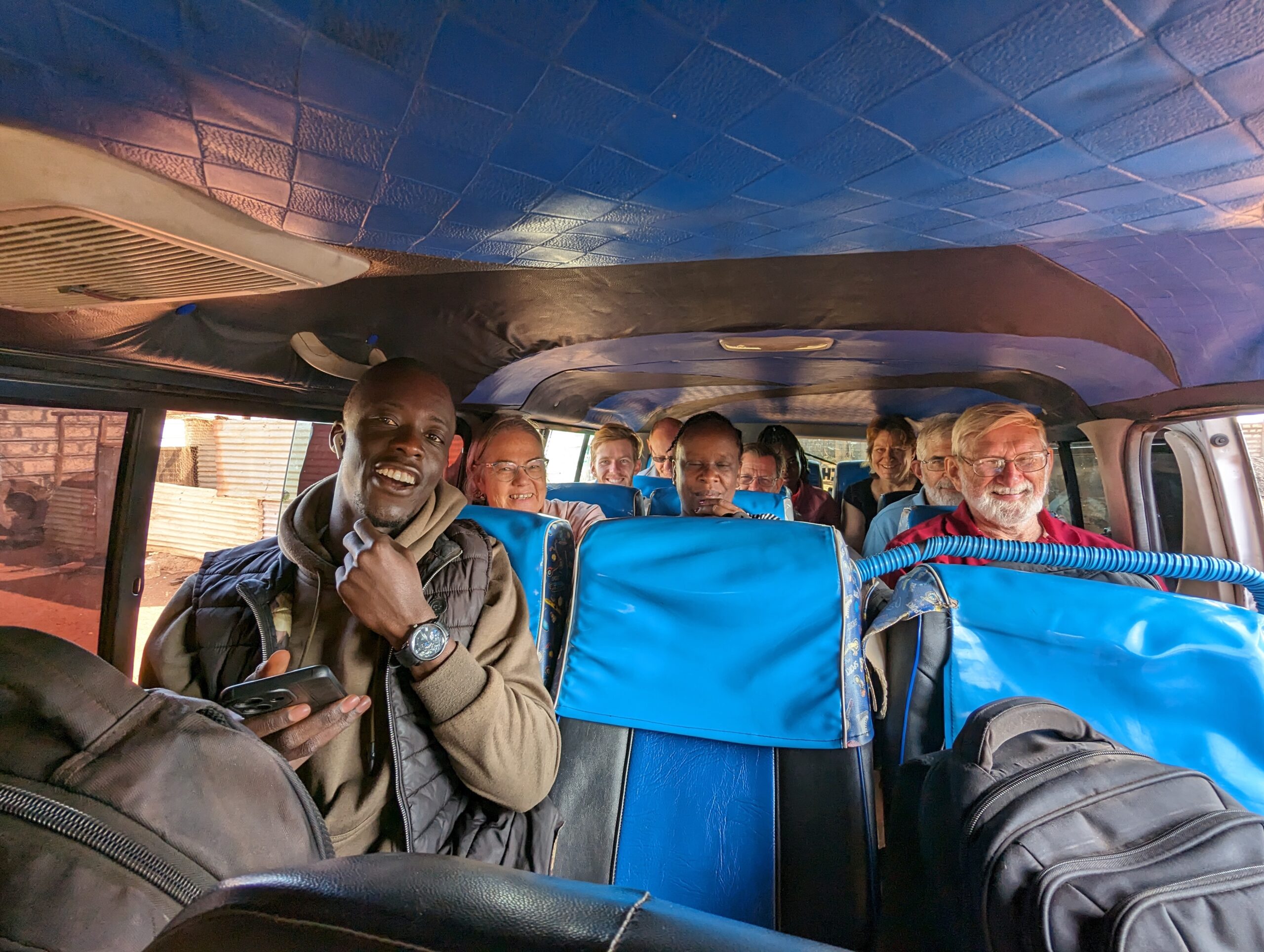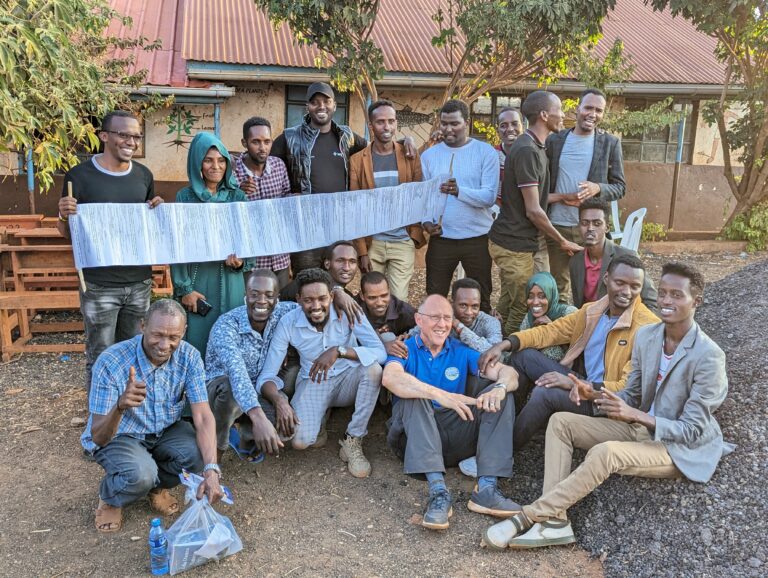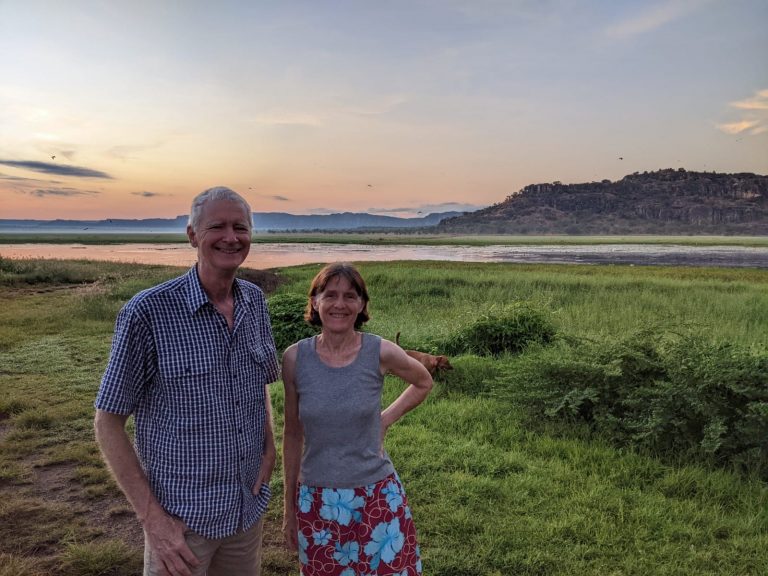Christ transforming culture: A safari adventure in Kenya
By Deb Fox | Wycliffe Today Autumn 2024 Edition
 In September 2023, Wycliffe Australia sent a team of nine people from Australia to Kenya to facilitate seven training events. The first three events were in far northern Kenya and mostly delivered in the Borana language. One major event was a Contextualisation Workshop, where Borana pastors and lay people studied their culture and worldviews in light of Scripture. Those involved in the workshop learned a new Bible story each day then went to local schools, where the stories were eagerly accepted by the children. At the same time, a different group of Boranas were learning The Matthew Drama script to help bring the words in the Bible to life. Over 900 Borana speakers (most not from a Christian background) attended the performances.
In September 2023, Wycliffe Australia sent a team of nine people from Australia to Kenya to facilitate seven training events. The first three events were in far northern Kenya and mostly delivered in the Borana language. One major event was a Contextualisation Workshop, where Borana pastors and lay people studied their culture and worldviews in light of Scripture. Those involved in the workshop learned a new Bible story each day then went to local schools, where the stories were eagerly accepted by the children. At the same time, a different group of Boranas were learning The Matthew Drama script to help bring the words in the Bible to life. Over 900 Borana speakers (most not from a Christian background) attended the performances.
Team leader, Keith Benn, explains that the purpose of the trip was to provide training and support for African pastors and those involved in Bible translation, while also encouraging Aussies to consider how they can support the global church in Scripture engagement and Bible storytelling. As Keith says, ‘An important goal for every church is making God’s Word relevant for their people’.
Philemon was one of the Kenyan pastors who expressed gratitude for attending the workshops:
 In our contextualisation class today, I learnt about the different rituals and the different festivals we do. I realised that, as Scripture depicts, Christ transforms culture – all culture. There is no culture that does not need transformation. Scripture says that God can transform them in a better way to ensure that God is the anchor of everything.
In our contextualisation class today, I learnt about the different rituals and the different festivals we do. I realised that, as Scripture depicts, Christ transforms culture – all culture. There is no culture that does not need transformation. Scripture says that God can transform them in a better way to ensure that God is the anchor of everything.

One of the Australian team members, Robert Love, was encouraged by the insights the Kenyan leaders shared during the workshops:
We’ve had a particularly fruitful and interesting time looking at traditional Mbeere beliefs and what the Bible says about them. In particular, we’ve been looking at how the Mbeere people believe that they go to sacrifice and make prayers to Gai (God) at special trees in order to get things that they want. Then we turn to the Bible, looking at some verses that help to throw some light on that particular belief. One passage in particular that has been helpful is Acts 17:24–25, ‘The God who made the world and everything in it is the Lord of heaven and earth and does not live in temples built by human hands. And he is not served by human hands, as if he needed anything. Rather, he himself gives everyone life and breath and everything else.
Images: Evan Mercer
Trained to share the good news
Wycliffe Today Winter 2023
The Bible is filled with stories that point to God’s love for us. How can we share these stories with others? Wycliffe Australia has been running Story the Bible workshops for many years to engage the church and equip people with skills to share Bible stories in simple, accurate and engaging ways.
Josh Bartlett is a Wycliffe Australia member and Board member who has been involved in leading several of these workshops. He says, ‘It is so encouraging to hear of participants applying what they’ve learnt’. Josh recalls a workshop held in Maleny, Queensland, at the end of 2022 that left a particular impression on one of the participants. After attending the training, a young man by the name of Liam immediately began using the skills he had acquired in his walk-up evangelism. Liam reflected:
I had a bit of a funny encounter doing walk-up evangelism –the guy we were chatting to asked me, out of the blue, if I had any Bible stories to tell him. So I told him the crucifixion story. We spent some time chatting about the different ways people respond to Jesus. He asked if good people go to heaven, so we looked at the parable of the Pharisee and the tax collector. Towards the end of the conversation, he was able to identify himself as a sinner who’s ignoring God and needing forgiveness. He was amazed at the switch between Barabbas and Jesus, and likewise that the tax collector was the one who was justified by God, not the Pharisee.
For more information about a Story the Bible workshop in your area, go to https://wycliffe.org.au/eventtype/story-the-bible-workshop/.
‘Sitting at Jesus’ feet’: leaning into God’s grace
By Deb Fox | Wycliffe Today Winter 2022 edition |
Tim and Jane Letcher have been serving in Epenarra, Central Australia, with their three young children. After marrying, they both attended Sydney Missionary and Bible College and started praying about how they could serve the Lord.
Tim developed a passion for Aboriginal ministry. He shares how his experience with Scripture engagement among Indigenous Australian communities continues to motivate him in the work God has laid on his heart:
I spent some time teaching at Fitzroy Crossing in the Kimberley (northern Western Australia). I saw many people having trouble engaging with Scripture – it was in English but not available in the languages that they understood best. So that’s been a huge motivator – helping people understand God’s Word as clearly as possible.
Tim has been working with some local speakers to record the first few chapters of 1 Samuel into Alyawarr. This Old Testament book, in particular, speaks to animistic cultures about learning to trust in God rather than other people, powers or spirits. It also demonstrates God’s desire for personal relationship and a change of heart, rather than something transactional. As Samuel says to King Saul, ‘What pleases the Lord more? Burnt offerings and sacrifices, or obeying the Lord?’ – 1 Samuel 15:22a (NIRV). Tim explains:
Many people here are quite nominal in their faith. They want to follow God as their ‘boss man’ but there is so much social pressure that pulls them away from church. They have trouble understanding grace. They think that they have to be these ‘perfect’ people in order to come back to God and learn more about him. We want to encourage them that God wants them to come to him just as they are.
Jane adds that they have been encouraged by the power of the gospel changing lives from the inside out:
Our neighbour became a Christian last year and it has totally transformed her life! She witnesses her faith wherever she goes. She told us that she was in a really bad spot when God reached her. She uses this to encourage people that the gospel actually does make a difference in people’s lives and it touches people at different times.
Jane shares how this experience, in addition to her own Bible reading, has reminded her to lean into God’s grace:
We are learning to implement safe boundaries with others and give the hard things over to God. Recently, a few really heavy things landed on me and I was feeling unsettled. I was buzzing around the kitchen to make things for those who were suffering and I was reading the story of Mary and Martha. Martha was concerned with urgent needs around her, yet Jesus said that only one thing was needed – to enjoy his presence. I realised that I also really just needed to sit at Jesus’ feet. When there is so much going on, it can feel like you’re wading through darkness. BUT our job is to sit at Jesus’ feet and encourage others to sit at his feet with us.
Please pray for:
- Indigenous Australian Christians to persevere in their faith
- more men to be changed by the gospel
- God to continue moving in the hearts and minds of people in Epenarra
- the Letchers as they settle back into life in Perth for a period of rest.
Christ transforming culture: training the trainers in Scripture engagement
By Deb Fox and Ross and Lyndal Webb | Wycliffe Today Winter 2022 edition |
 Ross and Lyndal Webb are Wycliffe Australia members who work with SIL Vanuatu. After many years in the country, they are currently working remotely from their home in Sydney. Their goal is to help the people of Vanuatu to read and understand God’s Word. Ross says he has learnt that honouring the culture of a language group is important – but no culture is without flaws in our fallen world. Without a clear understanding of how God’s Word applies to different contexts, churches and individuals risk creating an unhelpful mix of Christian doctrine with non-biblical beliefs. He shares:
Ross and Lyndal Webb are Wycliffe Australia members who work with SIL Vanuatu. After many years in the country, they are currently working remotely from their home in Sydney. Their goal is to help the people of Vanuatu to read and understand God’s Word. Ross says he has learnt that honouring the culture of a language group is important – but no culture is without flaws in our fallen world. Without a clear understanding of how God’s Word applies to different contexts, churches and individuals risk creating an unhelpful mix of Christian doctrine with non-biblical beliefs. He shares:
It’s easy for people to grasp when [the Bible] says ‘don’t do this’ and ‘do that’ but it’s hard to help people operate via principles from Scripture. We try to show how the Bible applies to daily life. It’s good to celebrate the positive aspects of a culture but it’s not helpful when there are features of that culture fighting against biblical living. There are genuine Christians, and lots of churches, but the idea of faith challenging culture is often a bit hard for many people to take. It says in Ephesians 4:22 that there are parts that we need to ‘add on’ to our lives and view of God. It stands to reason, then, that unhelpful aspects of our cultures need to be cut off. The best way to do that is to look at what it says about godly living from God’s Word.
Ross says that superstition and sorcery are still commonly accepted in Vanuatu:
People often suspect others of being sorcerers. Many believe that sorcery of different sorts, or ill feelings against someone, have the power to make people sick. That’s why I put together a study on what God says about sorcery. We need people to understand why beliefs like these are not good or helpful to Christian life.
Lyndal explains how these issues are addressed when training local church and community leaders:
We try to establish a strong foundation in the training, asking questions like: ‘Why do we translate the Bible? Why do this hard work to read and understand it accurately? Why study topics such as sorcery and marriage?’ We’re trying to help people read the Bible in context. We want people to know the true God of the Bible rather than one that they may invent.
Ross adds that the training program is designed to help prepare the next generation of leaders in ni-Vanuatu translation:
SIL Vanuatu’s director is encouraging us to ‘train the trainers’ because our current trainers are getting older. SIL Vanuatu has taken on two ni-Vanuatu men as interns to learn various aspects of Bible translation and Scripture Engagement. We need more learners like these guys with a desire to not only share God’s Word but also be transformed by it.
The next training courses were originally planned for April and May but COVID-19 lockdowns put things on hold until borders open up again.
Pray:
- for stamina and balance as the Webbs work remotely
- for new Wycliffe members due to arrive in Vanuatu
- that trainers and participants attending the training will hold fast to the truth in the Bible
- for God to be merciful on Vanuatu and prevent more suffering from COVID-19.
For more information about the training courses, go to https://wycliffe.org.au/projects/translator-training-vanuatu/
The legacy of a 60-year friendship and Scripture engagement
Dr Joseph Havel is a retired forestry officer now living in Western Australia. He has been a faithful supporter of Bible translation through the years, giving in various ways to Vision 2025 projects, Next Step Development projects and Wycliffe members, including friends, Richard and Aretta Loving (d). Dr Havel shares the story behind the deep friendships he formed in Papua New Guinea that gave him a heart for Bible translation:
By Dr Joseph Havel, Western Australia
 My contact with Richard and Aretta Loving started rather informally but it lasted for 60 years. Back in 1957, I was working as a forestry officer for the Australian administration of what was then the Territory of Papua and New Guinea. I was working at Bulolo, a gold mining and timber town.
My contact with Richard and Aretta Loving started rather informally but it lasted for 60 years. Back in 1957, I was working as a forestry officer for the Australian administration of what was then the Territory of Papua and New Guinea. I was working at Bulolo, a gold mining and timber town.
The project employed several hundred local workers, mainly hired in the highlands for a period of 18 months at a time. Some of the people we employed were from the Awa language group. On Sundays, I used to drive up to their camp in the rainforest above us, to run an adult Sunday school class. This was only possible because of an Awa translator and foreman, Yeda.
I used a New Testament in Neo-Melanesian (now called Tok Pisin)—a trade language used for contact between locals, administrators, traders and missionaries. I would read the lesson and make comments on it in Tok Pisin and Yeda would translate it into Awa.
A few months into our lessons, I had a visit from a rather tall American, not unlike Abraham Lincoln in looks, who introduced himself as Dick Loving. He explained that he was involved in translating the New Testament into the Awa language and he wanted to know who was running the Awa Sunday school class. When he found out that I was theologically sound, Dick gave me a partial copy of the Awa NT translation, and showed me how to read it phonetically.
After the translation for the Awa New Testament was completed, the Lovings moved around PNG before eventually heading to East Africa. By 1997, they were back in Papua New Guinea at the Ukarumpa centre, working on a revision of the New Testament translation. We continued correspondence and I supported them through Wycliffe.
I kept my contact with the Lovings afterwards until replies stopped in 2018. It was only recently that I learned that they passed away to be with the Lord ahead of me. I am grateful for the contact I had with them. Our friendship opened doors for me to experience firsthand the power of people receiving God’s Word in their own language. My connection to Wycliffe over the years has influenced my understanding and appreciation for mission and how we can all play a part in God’s work.
If you are thinking of leaving a legacy to Wycliffe, go to https://wycliffe.org.au/support/make-a-bequest/ for details. If you would prefer to talk directly with someone about this, please contact ceo@wycliffe.org.au.
 In September 2023, Wycliffe Australia sent a team of nine people from Australia to Kenya to facilitate seven training events. The first three events were in far northern Kenya and mostly delivered in the Borana language. One major event was a Contextualisation Workshop, where Borana pastors and lay people studied their culture and worldviews in light of Scripture. Those involved in the workshop learned a new Bible story each day then went to local schools, where the stories were eagerly accepted by the children. At the same time, a different group of Boranas were learning The Matthew Drama script to help bring the words in the Bible to life. Over 900 Borana speakers (most not from a Christian background) attended the performances.
In September 2023, Wycliffe Australia sent a team of nine people from Australia to Kenya to facilitate seven training events. The first three events were in far northern Kenya and mostly delivered in the Borana language. One major event was a Contextualisation Workshop, where Borana pastors and lay people studied their culture and worldviews in light of Scripture. Those involved in the workshop learned a new Bible story each day then went to local schools, where the stories were eagerly accepted by the children. At the same time, a different group of Boranas were learning The Matthew Drama script to help bring the words in the Bible to life. Over 900 Borana speakers (most not from a Christian background) attended the performances. In our contextualisation class today, I learnt about the different rituals and the different festivals we do. I realised that, as Scripture depicts, Christ transforms culture – all culture. There is no culture that does not need transformation. Scripture says that God can transform them in a better way to ensure that God is the anchor of everything.


 Ross and Lyndal Webb are Wycliffe Australia members who work with SIL Vanuatu. After many years in the country, they are currently working remotely from their home in Sydney. Their goal is to help the people of Vanuatu to read and understand God’s Word. Ross says he has learnt that honouring the culture of a language group is important – but no culture is without flaws in our fallen world. Without a clear understanding of how God’s Word applies to different contexts, churches and individuals risk creating an unhelpful mix of Christian doctrine with non-biblical beliefs. He shares:
Ross and Lyndal Webb are Wycliffe Australia members who work with SIL Vanuatu. After many years in the country, they are currently working remotely from their home in Sydney. Their goal is to help the people of Vanuatu to read and understand God’s Word. Ross says he has learnt that honouring the culture of a language group is important – but no culture is without flaws in our fallen world. Without a clear understanding of how God’s Word applies to different contexts, churches and individuals risk creating an unhelpful mix of Christian doctrine with non-biblical beliefs. He shares: My contact with Richard and Aretta Loving started rather informally but it lasted for 60 years. Back in 1957, I was working as a forestry officer for the Australian administration of what was then the Territory of Papua and New Guinea. I was working at Bulolo, a gold mining and timber town.
My contact with Richard and Aretta Loving started rather informally but it lasted for 60 years. Back in 1957, I was working as a forestry officer for the Australian administration of what was then the Territory of Papua and New Guinea. I was working at Bulolo, a gold mining and timber town.  Thanks for your patience...
Thanks for your patience...